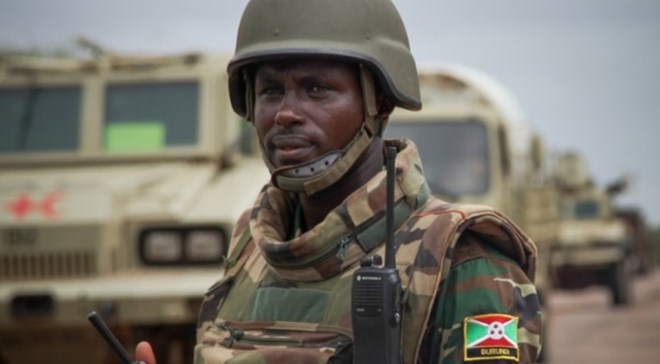
Wednesday January 18, 2017
By Elsa Buchanan

Last week, the Burundian authorities said they had ordered both Foreign and Defence Ministries to "begin the process" of withdrawing the nation's troops deployed in Somalia as part of the African Union (AMISOM) force, but a question mark remains over whether the authorities will go ahead with the pullout.
In March 2016, the European Union, which provides financial support for the AMISOM troops, stopped paying the monthly €5m (£4.34m) salaries of some 5,400 Burundian troops in Somalia as part of its restrictive measures against President Pierre Nkurunziza's government.
The EU blames Bujumbura for the surge in violence and failure to protect human rights. The AU today owes the Burundian government some €57m (£49.6m) for the unpaid allowances.
Burundian activists have questioned the veracity of the government's statements regarding the withdrawal of its troops, claiming Nkurunziza has no intention of pulling out his soldiers from the mission.
The president of civil society organisation FOCODE, activist-in-exile Pacifique Nininahazwe, who started the campaign #BringBackOurSoldiers, said that, even if the EU stopped funding the Burundian soldiers' wages a year ago, Nkurunziza may be hoping that he can pressure the AU to intervene with the EU in his favour.
"It is basically a debt the EU has to these soldiers, and he hopes this debt will be paid at some stage," the activist told IBTimes UK. "It's a means of pressure on the AU – Nkurunziza knows that if he were to immediately recall his troops, the AU would be in difficulty straight away and there would be consequences on the security in Somalia".
Another reason why Nkurunziza may be less inclined to call his troops back is that he also faces the possibility of the AU's Peace and Security Council (PSC) itself sending thousand of its troops to Burundi to protect civilian populations. The AU agreed to send troops to the conflict-ridden nation in December 2015, but pulled back at the end of January 2016.
According to Nininahazwe, it is in the Burundian president's interest to keep his soldiers in Somalia because they represent a significant source of revenue. A soldier in Burundi would typically receives some $100 a month, while one part of AMISOM would pocket around $800 over the same period.
"He uses this money at his own discretion to pay the Imbonerakure, and himself. He really needs this money," Nininahazwe explained, in reference to the members of the ruling party CNDD-FDD's youth wing, called Imbonerakure .
According to the activist, there were already contribution arrears at the time the EU was still funding the Burundian troops, which would explain why soldiers used to not receiving a regular monthly payment, are not rebelling today.
Secondly, and most importantly, the profitable mission in Somalia has Nkurunziza to maintain cohesion within the army, especially because it neutralises the predominantly Tutsi ex-Armed forces of Burundi (ex-FAB). Authorities cracked down on military officers suspected of being close to the opposition, particularly those linked to the failed May 2015 military coup.
"Even if the majority of ex-FAB wanted to engage in actions against the regime, the AMISOM salary is a deterrent. They are thinking if they tried to overthrow the regime, would they ever get this type of money? They will never receive such sums over their whole working lives," Nininahazwe said.
Ghilain Mahoro, a member of the Burundian diaspora in the UK, told IBTimes UK he hoped the EU "will not yield because AMISOM's money is what made the Burundian army remain behind Nkurunziza", and that recalling soldiers may lead to further instability in the country.
This comes nine months after the assassination of Colonel Emmanuel Buzubona, who was killed on 20 April in a commune of the capital, which was at the time described as "a clear evidence of growing divisions in the nation's army".
Burundi has threatened to sue the AU over its failure to remunerate its peacekeepers. The EU, meanwhile, said it would agree to pay the Burundian troops on the one condition that the salaries would be transferred directly to the officers, not to the Burundian authorities. This debate comes days ahead of a visit of AU commissioner of peace and security Smaïl Chergui, who previously said he is ready to re-negotiate payment with Bujumbura.
"The EU has done great by not paying soldiers directly through the government's accounts, as this is ensuring it is not funding the repressive institutions such as intelligence services, police and armed paramilitary groups," a Burundian peace activist, who asked to speak anonymously due to the sensitivity of the issue, told IBTimes UK.
"We would love our soldiers to come back to (Burundi to) ensure people are protected in case mass atrocities occur, but at least the international community realises it shouldn't contribute to the repression through AMISOM funds."
Burundi has been gripped by a social and political crisis for the past 18 months which has left an estimated 1,000 dead, 6,000 to 8,000 imprisoned and 20,000 missing. As of 16 January, some 533,199 Burundians have sought refuge in neighbouring countries.